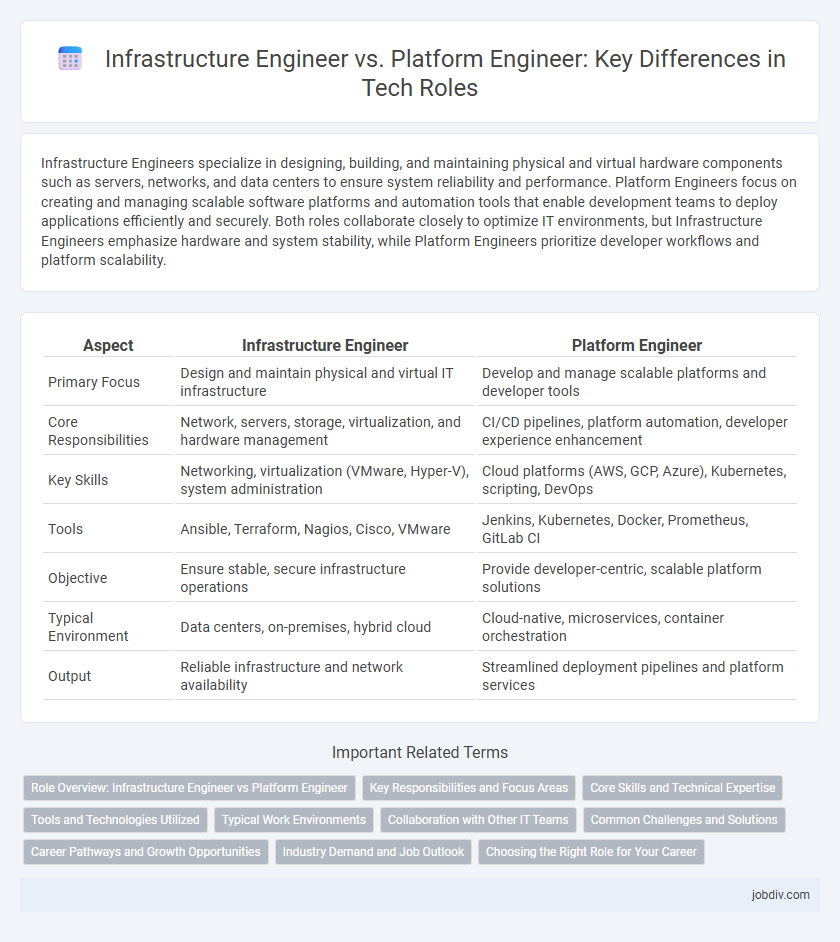Infrastructure Engineers specialize in designing, building, and maintaining physical and virtual hardware components such as servers, networks, and data centers to ensure system reliability and performance. Platform Engineers focus on creating and managing scalable software platforms and automation tools that enable development teams to deploy applications efficiently and securely. Both roles collaborate closely to optimize IT environments, but Infrastructure Engineers emphasize hardware and system stability, while Platform Engineers prioritize developer workflows and platform scalability.
Table of Comparison
| Aspect | Infrastructure Engineer | Platform Engineer |
|---|---|---|
| Primary Focus | Design and maintain physical and virtual IT infrastructure | Develop and manage scalable platforms and developer tools |
| Core Responsibilities | Network, servers, storage, virtualization, and hardware management | CI/CD pipelines, platform automation, developer experience enhancement |
| Key Skills | Networking, virtualization (VMware, Hyper-V), system administration | Cloud platforms (AWS, GCP, Azure), Kubernetes, scripting, DevOps |
| Tools | Ansible, Terraform, Nagios, Cisco, VMware | Jenkins, Kubernetes, Docker, Prometheus, GitLab CI |
| Objective | Ensure stable, secure infrastructure operations | Provide developer-centric, scalable platform solutions |
| Typical Environment | Data centers, on-premises, hybrid cloud | Cloud-native, microservices, container orchestration |
| Output | Reliable infrastructure and network availability | Streamlined deployment pipelines and platform services |
Role Overview: Infrastructure Engineer vs Platform Engineer
Infrastructure Engineers specialize in designing, deploying, and maintaining physical and virtual hardware systems, ensuring network reliability, server performance, and data center operations. Platform Engineers focus on building and managing scalable software platforms that facilitate continuous integration and deployment, automating workflows and enabling developer productivity through robust infrastructure-as-code practices. Both roles collaborate to enhance system stability but differ in scope, with Infrastructure Engineers concentrating on foundational hardware and networks, while Platform Engineers emphasize software ecosystems and developer experience.
Key Responsibilities and Focus Areas
Infrastructure Engineers specialize in designing, deploying, and maintaining physical and virtual network systems, servers, and storage solutions to ensure high availability and performance of IT infrastructure. Platform Engineers focus on building scalable, automated platforms and development environments by integrating software, tools, and infrastructure through continuous integration and continuous deployment (CI/CD) pipelines. While Infrastructure Engineers emphasize system reliability and hardware optimization, Platform Engineers prioritize developer productivity and seamless platform management through automation and container orchestration.
Core Skills and Technical Expertise
Infrastructure Engineers specialize in managing and maintaining physical and virtual infrastructure, including network configurations, server provisioning, and hardware optimization, emphasizing reliability and scalability. Platform Engineers focus on designing and developing scalable platforms and automation tools, leveraging container orchestration, CI/CD pipelines, and cloud-native technologies to streamline development and deployment workflows. Both roles require strong proficiency in scripting languages, cloud platforms like AWS or Azure, and infrastructure-as-code tools such as Terraform or Ansible, but Platform Engineers prioritize software-driven solutions for platform scalability and developer experience.
Tools and Technologies Utilized
Infrastructure Engineers primarily utilize tools like Terraform, Ansible, and VMware to design, deploy, and maintain physical and virtual infrastructure components, focusing on servers, networks, and storage systems. Platform Engineers leverage Kubernetes, Docker, and CI/CD pipelines such as Jenkins or GitLab CI to build, automate, and optimize scalable developer platforms and cloud-native environments. Both roles require proficiency in cloud services like AWS, Azure, or Google Cloud, but Platform Engineers emphasize container orchestration and application lifecycle management, while Infrastructure Engineers concentrate on underlying hardware and network infrastructure stability.
Typical Work Environments
Infrastructure Engineers primarily operate in data centers, cloud environments, and enterprise IT settings where they manage hardware, networking, and system administration. Platform Engineers work within cloud-native environments, development operations teams, and continuous integration/continuous deployment (CI/CD) pipelines to build and maintain scalable software platforms. Both roles collaborate closely with DevOps teams but emphasize different layers of the technology stack.
Collaboration with Other IT Teams
Infrastructure Engineers collaborate closely with network, security, and system administration teams to ensure robust hardware and software environments. Platform Engineers engage with software development, DevOps, and QA teams to design, build, and maintain scalable and automated platforms for application deployment. Both roles require seamless communication and coordination to align infrastructure stability with platform agility and development workflows.
Common Challenges and Solutions
Infrastructure Engineers face challenges in managing scalable networks and ensuring system reliability, often resolving these through automation tools like Ansible and Terraform. Platform Engineers confront difficulties in integrating diverse development environments and optimizing continuous deployment pipelines, frequently employing Kubernetes and CI/CD frameworks to streamline workflows. Both roles tackle security vulnerabilities by implementing robust monitoring and incident response strategies using tools such as Prometheus and ELK Stack.
Career Pathways and Growth Opportunities
Infrastructure Engineers specialize in designing, deploying, and managing foundational IT systems such as servers, networks, and storage, with career growth often leading to roles in systems architecture or IT management. Platform Engineers focus on building and maintaining scalable software platforms and automation tools, opening pathways to senior DevOps, site reliability engineering (SRE), or cloud-native architecture positions. Both roles offer strong demand in cloud computing and digital transformation sectors, with Platform Engineers typically experiencing faster advancement due to increasing reliance on automated, cloud-based infrastructures.
Industry Demand and Job Outlook
Infrastructure Engineers are increasingly sought after for their expertise in designing, implementing, and maintaining physical and cloud-based networks, with job demand driven by growing IT infrastructures and cybersecurity needs. Platform Engineers, specializing in creating scalable development environments and automating deployment pipelines, are experiencing rapid growth as companies adopt DevOps and cloud-native technologies. Industry forecasts predict strong job outlooks for both roles, with Platform Engineers seeing higher salary growth due to their critical role in accelerating software delivery and innovation.
Choosing the Right Role for Your Career
Infrastructure Engineers specialize in designing, deploying, and maintaining physical and virtual networks, servers, and storage systems to ensure optimal system performance and reliability. Platform Engineers focus on building and managing scalable software platforms and automation tools that streamline development and deployment processes for faster delivery. Choosing the right role depends on your interest in hands-on hardware and network management versus developing and optimizing software platforms and CI/CD pipelines.
Infrastructure Engineer vs Platform Engineer Infographic

 jobdiv.com
jobdiv.com